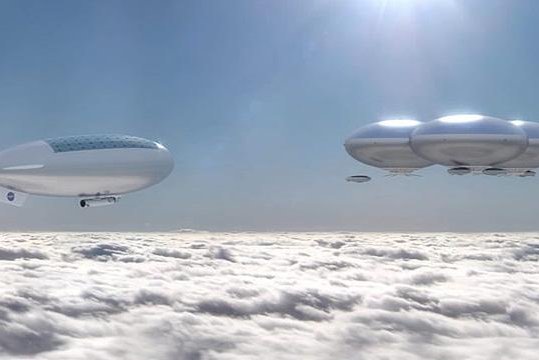A rendering of what a Venus-orbiting dirigible might look like. Image by NASA/Langley Research Center
WASHINGTON, Dec. 19 (UPI) -- The science world has been mostly fixated on Mars and comets, but some scientists at NASA are starting to talk about Venus -- suggesting a manned mission to our closest neighbor could be simpler and less expensive than a trip to Mars.
For some time, Mars has been the logical next step for the United States space program. It's the closest planet with tolerable, Earth-like conditions. NASA has three robotic rovers actively exploring the Martian planet, and plans to send astronauts to the Red Planet by the 2030s are underway.
But Venus is actually closer to Earth than Mars, and experts say a manned mission there isn't unreasonable. Venus is one of the least hospitable places in the solar system. Its close proximity to the sun makes its surface unimaginably hot -- 462 degrees Celsius. And its lower atmosphere is a highly pressurized oven of noxious gases.
A manned mission to Venus, however, wouldn't have to involve the planet's surface. Researchers say just a few miles higher up and Venus's atmosphere boasts conditions not unlike Earth's, with more a manageable temperature and pressure.
A new study by researchers at the Systems Analysis and Concepts Directorate, part of the NASA Langley Research Center, suggests astronauts could circle Venus in a helium-inflated dirigible -- conducting science experiments as they orbit.
"Venus has value as a destination in and of itself for exploration and colonization," NASA scientist Chris Jones, one of the researchers working on the High Altitude Venus Operational Concept (HAVOC), told IEEE. Jones and fellow researcher Dale Arney say a trip to Venus doesn't have to bee seen as a distraction from NASA's plans for Mars. It could be complementary.
"There are things that you would need to do for a Mars mission, but we see a little easier path through Venus," Jones said.
"If you did Venus first, you could get a leg up on advancing those technologies and those capabilities ahead of doing a human-scale Mars mission. It's a chance to do a practice run, if you will, of going to Mars," Arney said.















